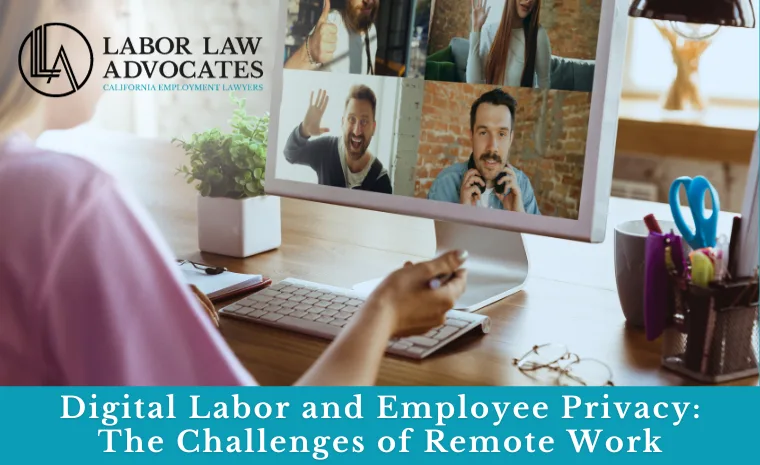In the wake of the pandemic, the landscape of labor witnessed a profound shift, with remote work emerging as a defining feature of the modern workplace. The arrival of digital labor started an age of flexibility and efficiency, allowing employees to get past geographical barriers and work from the comfort of their homes. However, as private companies increasingly embrace remote work, the intersection between digital labor and employee privacy has become a critical point of concern for both employers and employees.
According to the U.S. Census, the number of American workers engaged in remote work tripled during the peak of the COVID-19 pandemic. While this change was initially driven by necessity, it has now become a normal part of work. With this, the challenges around the protection of employee privacy have intensified, raising critical questions about the balance between technological surveillance and individual rights.
Striking the right balance between organizational needs and employee privacy rights has become imperative. In this blog, we will delve into the nuances of digital labor, exploring the challenges associated with remote work and the legal considerations around employee privacy in the digital age.
The Popularity of Remote Work in California
The growing need and popularity of remote work across the United States represents a profound evolution in the traditional concept of the workplace. Accelerated by technological advancements, demographic shifts, and the global response to the COVID-19 pandemic, remote work has transcended its initial status as a temporary solution to become a permanent and prevalent aspect of the American professional landscape.
California, often at the forefront of societal and technological trends, has played a pivotal role in shaping the remote work revolution. With its vibrant tech industry and emphasis on innovation, the state has been a breeding ground for the development and adoption of remote work technologies and practices. The Silicon Valley ethos of flexibility and creativity has permeated various sectors, contributing to the widespread acceptance of remote work as a viable and efficient alternative to the traditional office setting.
However, at the same time, employee privacy laws in California took a prominent place with this change. Designed to safeguard the rights of workers while recognizing the legitimate needs of employers to maintain a productive and secure workplace, California places a premium on employee privacy, dictating the boundaries within which employers must operate during the monitoring of employees.
The California Constitution explicitly recognizes the right to privacy, and various statutes, such as the California Consumer Privacy Act (CCPA) and the California Online Privacy Protection Act (CalOPPA), extend privacy protections to employees, with one of its primary considerations being the monitoring of digital communications. The California Electronic Communications Privacy Act (CalECPA) restricts employers from accessing employees’ personal communications and electronic devices without consent, with certain exceptions for legitimate business purposes.
In addition to communications, the CCPA grants employees the right to know what personal information is collected, the purposes for which it is used, and the right to opt-out of the sale of their personal information. This law empowers employees to have greater control over their personal data and signals a growing awareness of privacy concerns in the digital age. Similarly, workplace surveillance, such as video monitoring or GPS tracking of employees, must be implemented with caution, taking into account employees’ reasonable expectations of privacy.
Private employers must navigate these legal parameters with care, ensuring that their workplace policies and practices align with the law while addressing legitimate business needs. Establishing clear and transparent communication about privacy expectations, as well as obtaining informed consent when necessary from their current employees, is essential in fostering a workplace culture that respects both employer interests and employee privacy rights.

The Realities of Digital Labor and Privacy
Digital labor has transformed the traditional workplace, introducing new paradigms of productivity and collaboration. However, the rise of digital labor has also brought forth employee monitoring processes that raise important concerns about privacy, consent, and communication between employers and employees.
Potential employee monitoring in the digital age encompasses various practices, including but not limited to computer and internet usage tracking, email monitoring, GPS tracking, and video surveillance. While these monitoring methods can enhance productivity and security, they also pose potential risks to employee productivity, privacy and morale.
Employee Monitoring Processes
- Company Property and Internet Usage Tracking: Employers may implement software to monitor the use of company computers and internet resources. This can include tracking websites visited, time spent on specific tasks, unreasonable searches, and keystrokes.
- Email Monitoring: Employers may monitor employee activity, like emails, for various reasons, such as ensuring compliance with company policies, preventing data breaches, and protecting intellectual property and workplace communications.
- GPS Tracking: For employees whose work involves travel, GPS tracking on company-owned vehicles or mobile devices can be used to monitor locations and optimize routes.
- Video Surveillance: Video cameras in the workplace may be utilized for security purposes, but they can also be a tool for monitoring employee behavior and attendance. There should be a notice to employees about their use of video recordings.
Concerns and Employee Privacy
The implementation of such monitoring processes raises concerns about employment relationships and employee privacy risks. Employees may feel their every move is being scrutinized, leading to stress and a sense of mistrust. Excessive monitoring can also create a culture of surveillance, potentially impacting employee morale and job satisfaction, or representing an invasion of privacy.
Consent and Communication
Obtaining employee consent and maintaining transparent communication are crucial components in navigating the delicate balance between monitoring for legitimate business reasons and respecting employee privacy. Among these conditions of employment, you can find:
- Informed Consent: Employers should clearly communicate their monitoring practices to employees and obtain informed consent. This can be achieved through comprehensive policies, employment agreements, or specific consent forms.
- Transparency: Open communication about the purposes and methods of monitoring helps build trust between employers and employees. Employers should be transparent about what data is being collected, how it will be used, and the measures in place to protect sensitive information.
Consequences of Breach
Breaching the trust established through consent and communication can have severe consequences. Legal repercussions may arise if monitoring practices violate privacy laws or employment contracts. Additionally, breaches of trust can lead to decreased employee morale, increased turnover, and damage to the employer’s reputation.
In the event that your employee rights are violated, seeking the expertise of a labor law attorney becomes crucial. This legal professional can provide invaluable guidance in these legal issues, ensuring that the rights and dignity of workers are protected while maintaining the productivity goals of the workplace. Establishing and preserving this delicate balance is instrumental in fostering a work environment that values both efficiency and the rights of its workforce.
California Privacy Laws for Employees
Employees in the United States, including California, have certain rights and legal protections regarding their privacy and workplace conditions. If an employer violates these rights or applicable laws, employees generally have the right to file a claim or take legal action. However, the specific rights and available remedies can vary based on the nature of the violation and the relevant laws.
Some of the California privacy laws for employees you should be aware of are:
Privacy Rights
- Federal and State Laws: Employees have a reasonable expectation of privacy in the workplace. Violations may occur if employers conduct unwarranted searches, surveillance, or monitor personal communications. Laws such as the CalECPA provide privacy protections.
- Claims: If an employer violates an employee’s privacy rights, the employee may have grounds to file a legal claim. This could involve bringing a lawsuit or filing a complaint with relevant regulatory agencies.
Wage and Hour Laws
- Fair Labor Standards Act (FLSA): The FLSA establishes minimum wage, overtime pay eligibility, recordkeeping, and child labor standards. Violations may include unpaid wages, failure to pay overtime, or misclassification of employees.
- Claims: Employees have the right to file complaints with the Wage and Hour Division of the U.S. Department of Labor or pursue legal action to recover unpaid wages.
Discrimination and Harassment
- Title VII of the Civil Rights Act: These laws prohibit discrimination and harassment based on factors such as race, color, religion, sex, national origin, disability, or age.
- Claims: Employees can file complaints with the Equal Employment Opportunity Commission (EEOC) or the California Department of Fair Employment and Housing (DFEH). They may also file a lawsuit against the employer for damages.
Whistleblower Protections
- Various Federal and State Laws: Whistleblower protections exist to shield employees who report illegal or unethical activities from retaliation.
- Claims: Employees can file complaints with the Occupational Safety and Health Administration (OSHA) or other relevant agencies. They may also bring legal action if they experience retaliation for whistleblowing activities.
Violation of Employment Contracts
- Employment Contracts: If an employer breaches the terms of an employment contract, employees may have legal recourse.
- Claims: Employees can file a breach of contract lawsuit seeking damages for any harm resulting from the employer’s violation of the contract terms.
Furthermore, wage, hours, and benefits laws in California can play a crucial role in safeguarding the right to privacy for remote workers. These regulations, designed to ensure fair treatment and adequate compensation, indirectly contribute to privacy protection. For instance, limits on working hours and overtime requirements prevent employers from encroaching on personal time, fostering a boundary between professional duties and private life. Additionally, laws mandating meal and rest breaks contribute to a healthier work-life balance, further preserving the privacy of remote workers.
In any case, employees need to be aware of their rights to privacy and consult with legal professionals if they believe their rights have been violated. Before pursuing legal action, employees may also have the option to engage in informal dispute resolution processes or file complaints with relevant regulatory agencies.
Your Rights Matter at the Office or at Home
The advent of remote work has reshaped the labor landscape, presenting both opportunities and challenges, particularly in employee privacy. As digital labor becomes increasingly prevalent, the delicate balance between organizational needs and individual rights takes center stage. In California, a pioneer in remote work practices, the emphasis on employee privacy is evident through robust legal frameworks.
The implementation of digital monitoring processes in the workplace raises legitimate privacy concerns, necessitating the importance of obtaining informed consent and fostering transparent communication between employers and employees. Breaches of trust in this delicate balance can have severe consequences, including legal repercussions and damage to the employer’s reputation. Employees in the digital age have rights and protections under federal and state laws, ranging from privacy rights to safeguards against discrimination, harassment, and retaliation. In the event of a rights violation, seeking the guidance of a labor law attorney becomes crucial to ensure the protection of workers’ rights and dignity. As remote work evolves, staying informed about one’s rights and engaging in appropriate dispute-resolution processes are integral steps in navigating the complex intersection of digital labor and employee privacy.




